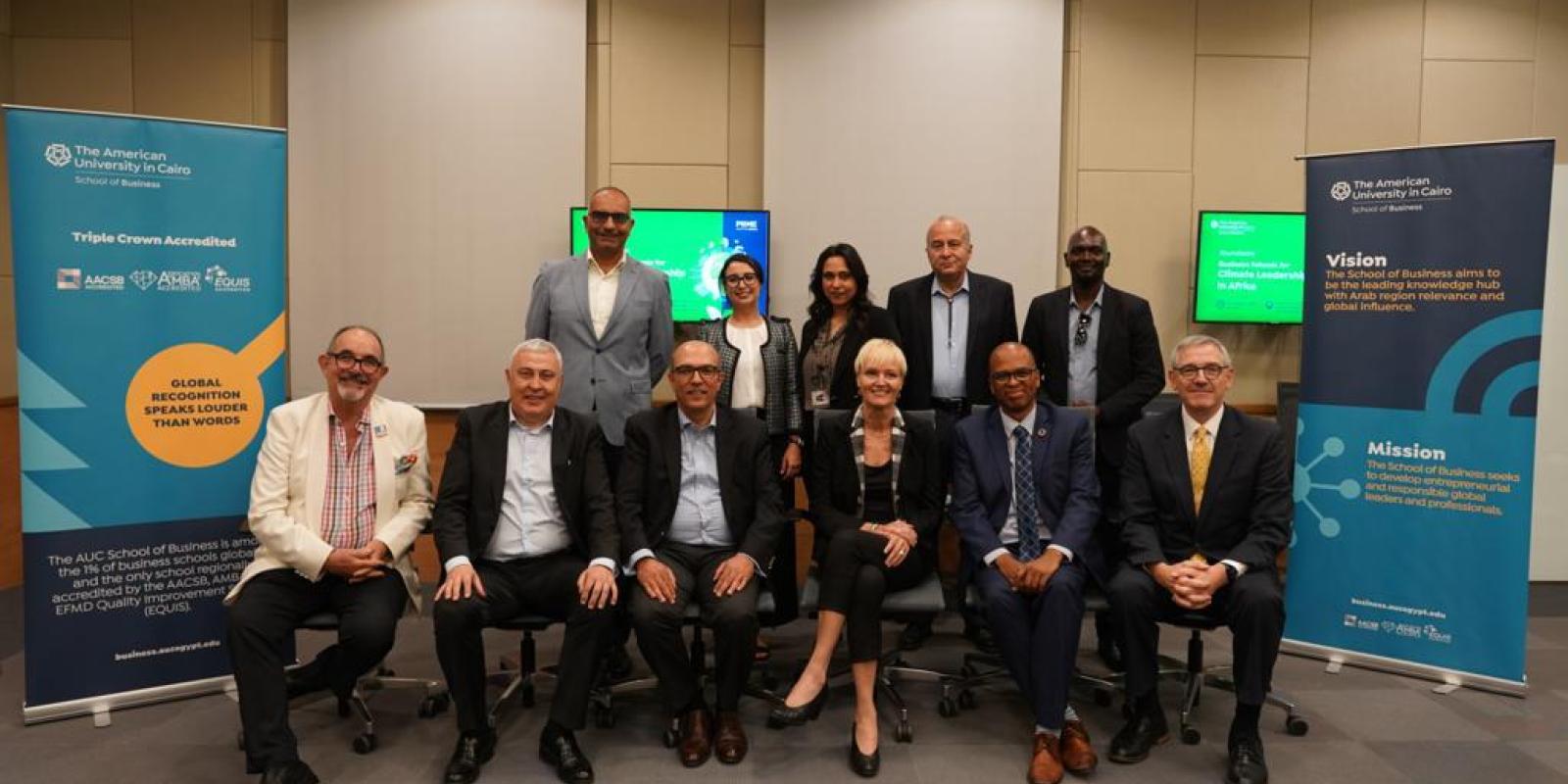
At AUC School of Business: Leading African Business Schools Launch Climate Leadership Initiative
At the Deans Roundtable hosted by the School of Business at The American University in Cairo (AUC) yesterday, deans of six leading African business schools and representatives from the African Chapter of the Principles for Responsible Management Education (PRME) and European Business Schools for Climate Leadership (BS4CL) announced the launch of the Business Schools for Climate Leadership (BS4CL Africa) initiative.
BS4CL Africa brings together schools of business in building a collaborative framework for climate action to transform business education curricula to match the needs and adapt to the realities of the African continent. The initiative will also invite contributions from the private sector and civil society and will mirror the ambitions of the UN Climate Conference (COP27) taking place in parallel in Sharm El-Sheikh, Egypt. BS4CL Africa is based on the model inspired by the BS4CL group, which was initiated by eight leading business schools in Europe at COP26 last year.
Recognizing the critical role that higher education plays in addressing climate change and its associated challenges, the Dean of AUC School of Business, Sherif Kamel said: “Our ultimate goal is for business schools to effectively address climate change issues by integrating such timely and critical subjects within the business schools’ ecosystem. This encompasses teaching, curriculum, cases, and projects including research endeavors and business development activities, as they help shape the next generation of leaders to impact society.”
The roundtable discussions engaged deans, academics and thought leaders representing PRME, The Financial Times, the Association of African Business Schools (AABS), the United Nations Framework Convention on Climate Change (UNFCCC), and Business Schools for Climate Leadership (BS4CL).
Peter Tufano, Baker Foundation Professor, Harvard Business School Emeritus Dean and Professor, and BS4CL founding member, shared his support of the Africa-centered edition of BS4CL: “I am thrilled to represent BS4CL at the launch of BS4CL Africa aligning with the opening of COP27. Business schools and businesses have much to contribute to battling climate change and its impacts, and BS4CL Africa will bring an authentic and important African perspective to this global and local issue.”
Topics discussed at the roundtable focused on the required resources for associated activities to increase awareness and climate action, including gathering Deans’ support, institutional commitment, dedicated faculty, and partnership champions. The discussion candidly addressed issues and possible hindrances like resource limitations, prioritization conflicts, school competition, industry commitment, and being able to sell value to students as business schools. As a result, the initiative plans to develop a white paper for attainable action by business schools.
“BS4CL Africa exemplifies how African businesses are already taking responsibility for their impact on the planet and considering the planet’s impact on their businesses. PRME Chapter Africa continues to produce thought leadership in this area through its programs and network. After its launch one year ago, its membership has already grown to 20 schools out of the larger PRME network of over 860 higher education institutions. BS4CL Africa initiative is sure to be one of high impact into the future”, commented Mette Morsing, Head of PRME Principles for Responsible Management Education, UN Global Compact.
“We are excited about the momentum of BS4CL Africa and envision that the Deans Roundtable will be a continued collaboration for impact, one which closely aligns with the ambitions of PRME,” said Sherwat Elwan Ibrahim, Chair of PRME Chapter Africa.
The BS4CL initiative, which began at COP26 in 2021 with eight European business schools set the tone for business schools, in Europe and abroad in designating climate leadership at the forefront of their schools’ strategies. BS4CL Africa now hopes to influence business in Africa with its growing momentum in collaboration with The AUC School of Business, PRME Chapter Africa, and the BS4CL European initiative.
PRME African chapter is one of 17 regional networks of the PRME, an initiative of the United Nations Global Compact aimed at mobilizing business management and leadership education in pursuit of the Sustainable Development Goals (SDGs).
Participants at the roundtable included Sherif Kamel, Dean of the School of Business at The American University in Cairo, Egypt; Thami Ghorfi, President of ESCA Ecole de Management in Morocco; Morris Mthombeni, Dean of Gordon Institute of Business Science in South Africa; Yinka David-West, Deputy Dean of Lagos Business School in Nigeria; David Chiawo, Dean of the School of Tourism and Hospitality at Strathmore University in Kenya; and Mark Smith, Director of Stellenbosch Business School in South Africa. Also participating in the roundtable: Jonathan Foster-Pedley, Chair of the Association of African Business Schools (AABS); Sarah El-Battouty, Global Ambassador for the United Nations Framework Convention on Climate Change (UNFCCC); Mette Morsing, Head of Principles for Responsible Management Education (PRME) at UN Global Compact; Peter Tufano, Dean Emeritus of Said Business School at the University of Oxford, Baker Foundation Professor at Harvard Business School and BS4CL Founding Team; Andrew Jack, Global Education Editor at The Financial Times; Sherwat Elwan Ibrahim, Chair of PRME Chapter Africa; and Mumbi Wachira, Vice-Chair of PRME Chapter Africa.
For information about AUC’s climate change initiative, visit https://www.aucegypt.edu/climate-change